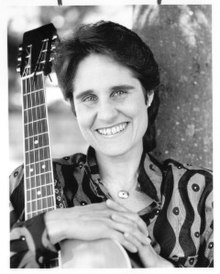Debbie Friedman
| Debbie Friedman | |
|---|---|
 |
|
| Background information | |
| Birth name | Deborah Lynn Friedman |
| Born |
February 23, 1951 Utica, New York |
| Died | January 9, 2011 (aged 59) Mission Viejo, California |
| Genres | Music-Jewish Liturgy |
| Occupation(s) | Jewish songwriter/songleader |
| Instruments | Guitar |
| Years active | 1971–2011 |
| Website | debbiefriedman |
| Notable instruments | |
| Guitar | |
Deborah Lynn "Debbie" Friedman (February 23, 1951 – January 9, 2011) was an American singer-songwriter of Jewish religious songs and melodies. She was born in Utica, New York, but moved with her family to Minnesota at age 6. She is best known for her setting of "Mi Shebeirach", the prayer for healing, which is used by hundreds of congregations across America. Her songs were used by some Orthodox Jewish congregations, as well as non-Orthodox Jewish congregations. Ms. Friedman was a feminist, and Orthodox Jewish feminist Blu Greenberg noted that while Ms. Friedman’s music impacted most on Reform and Conservative liturgy, "she had a large impact [in] Modern Orthodox shuls, women’s tefillah [prayer], the Orthodox feminist circles.... She was a religious bard and angel for the entire community."
Debbie was the daughter of Freda and Gabriel Friedman.
She wrote many of her early songs as a song leader at the overnight camp Olin-Sang-Ruby Union Institute in Oconomowoc, Wisconsin, in the early 1970s. Between 1971 and 2010 she recorded 22 albums. Her work was inspired by such diverse sources as Joan Baez, Peter, Paul and Mary, and a number of other folk music artists. Friedman employed both English and Hebrew lyrics and wrote for all ages. Some of her songs are "The Aleph Bet Song", "Miriam's Song", and the songs "Not By Might" and "I am a Latke". She also performed in synagogues and concert halls.
Friedman had suffered since the 1990s from a neurological condition, with effects apparently similar to multiple sclerosis. The story of her music, as well as the challenges she faced in living with illness, were featured in a 2004 documentary film about Friedman called A Journey of Spirit, produced by Ann Coppel, which followed her from 1997 to 2002.
...
Wikipedia
